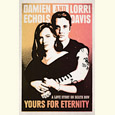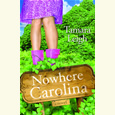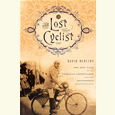The Full Story
Brandi Carlile pens a frank, vulnerable memoir
Americana artist Brandi Carlile’s slow-burning ballad “The Story” begins, “All of these lines across my face / tell you the story of who I am / So many stories of where I’ve been / and how I got to where I am.” Carlile’s new memoir Broken Horses is a candid, full rendering of those stories — tales of music, faith, and growing up that tell us who she is and maybe even a bit about ourselves.
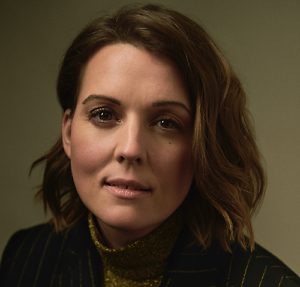
The first chapters recall Carlile’s childhood in the luscious, wild country of western Washington. Her family of hippies and musical misfits nurses her talents as 9-year-old Carlile debuts at the Northwest Grand Ole Opry. The applause from the audience was, she says, “the nail in the coffin of any other path I might have gone down.” After years gigging around Seattle, an opening slot for Dave Matthews puts her in touch with producer-extraordinaire Rick Rubin. It’s off to the races from there, as we follow Carlile through the next 15 years of her ascent to Grammy-winning fame.
Decidedly vulnerable and diaristic, Broken Horses is at its best when Carlile disarms us with earnestness. In one memory, while recording her sophomore album in her “adopted home of Nashville,” Carlile bottoms out emotionally. Depressed and dependent on Xanax and steroids, she’s “rudderless”: “When I’m in the grips of my ego I fill my life with restrictions followed by secrets and emotional bingeing.” Incisive moments like this light up the page, excusing Carlile’s occasionally distracted, meandering prose.
Carlile penned this book as she approaches her 40th birthday this June. Forty is relatively young to write a memoir, but Broken Horses proves that a more youthful perspective can be a strength. Here, the memories feel fresh.
Growing up, Carlile was the only openly gay person in her town. Her family embraced her as the Lilith Fair-attending, Indigo Girl-loving lesbian she was, but others’ judgment created feelings of “panic and exclusion.”
She was “drawn to church when [she] came out of the closet as both a comfort and out of fear. Church made sense of things.” After attending Christian summer camp, she feels supported by that community — until her baptism. Before the ceremony, the pastor asks Carlile if she “practices homosexuality,” saying, “… if you can’t repent, I can’t baptize you.” She’s turned away. Shame and a sense of low self-worth reverberate within her. Looking elsewhere for community, she decides to “find salvation where the rest of the misfits and the rejects find it. Through twisted, joyful, sexual, weird, and wonderful music.”
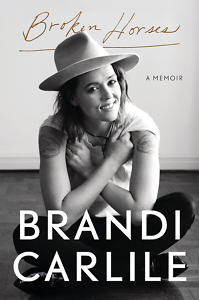 So, when Carlile wanders into a church in Nashville during her rock-bottom moment and starts praying, it’s a shock for the reader. But as we move through the memoir, it becomes apparent that Carlile’s adult “come-to-Jesus” moment serves as the initial step in a long reckoning with the untruths that her religious trauma misled her into believing about herself and her identity as a queer woman. She processes the trauma caused by the rigidity of Christian tradition through the lens of her rejuvenated faith: a Christian spirituality concerned with compassion and inclusivity.
So, when Carlile wanders into a church in Nashville during her rock-bottom moment and starts praying, it’s a shock for the reader. But as we move through the memoir, it becomes apparent that Carlile’s adult “come-to-Jesus” moment serves as the initial step in a long reckoning with the untruths that her religious trauma misled her into believing about herself and her identity as a queer woman. She processes the trauma caused by the rigidity of Christian tradition through the lens of her rejuvenated faith: a Christian spirituality concerned with compassion and inclusivity.
She cites Brennan Manning, author of Ragamuffin Gospel, whom she describes as a “disgraced divorced, alcoholic Jesuit,” as a force in her re-education: “He taught me a new way to say the phrase ‘The Lord is my shepherd; I shall not want’… He replaces ‘I shall not want’ with the Greek understanding: ‘I lack nothing’ … This subtle difference is night and day to a self-punishing person.”
Her “botched baptism” still clouds her thoughts, but she astutely remarks, “Maybe baptism, like ‘coming out,’ isn’t a moment after all,” subverting the notion that culturally imposed rituals have to be bombastic or transformational for those who go through them.
While faith isn’t the central theme of Broken Horses, reconnecting with spirituality is a consequential step in Carlile finding her joy. She begins to esteem herself in her creativity: “I knew I was going to be okay because the songs were very good, and for the first time in a long time, I believed that I was very good.”
In a delightful twist, Joni Mitchell acts as the final chapters’ guest of honor. The two become friends at the 2019 Grammys, and Mitchell invites Carlile to organize jams at her home. Guests like Elton John and Herbie Hancock make appearances during these nights straight from lore.
Like most post-Laurel Canyon songwriters, Mitchell’s influence runs deep in Carlile’s work. Carlile writes, “[Mitchell] has often alluded to the idea that she has left the beginnings of concepts and art out in the ether for people to find and finish. She has famously stated something like: ‘If you find me in my work, I haven’t done my job. If you find yourself, then I’m an artist.’” This philosophy imbues Broken Horses, as Carlile plants seeds of contemplation for the reader to consider themes of reckoning and love in their own stories, crafting a memoir with deft moments of vulnerability.
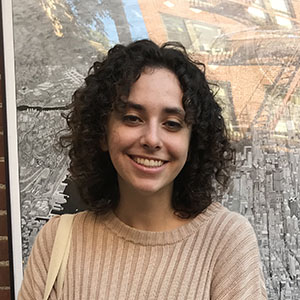
Jacqueline Zeisloft is a writer and editor whose work has appeared in the Nashville Scene and the Women’s Review of Books. She holds a B.A. in English literature from Belmont University and is a graduate of the Columbia Publishing Course. She currently resides in New York City.
